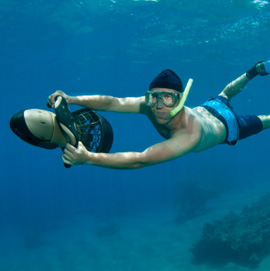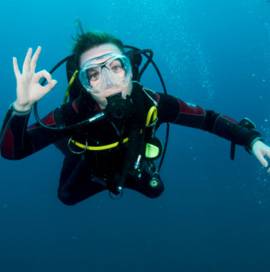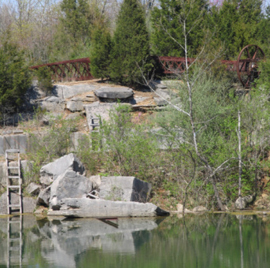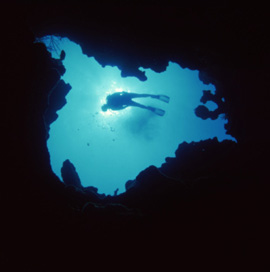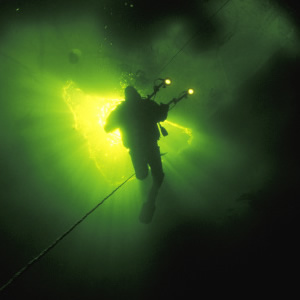Jan | Do Dive In
Take Your Fun Dive Further with a DPV
Here’s a no-brainer for you: how would you like to go further, faster and feel like James Bond on your next diving excursion? Though you may not have a super-spy accent or access to a jetpack or remote-controlled BMW, you can learn how to use one of Bond’s favorite forms of underwater transportation—the diver propulsion vehicle (DPV) or underwater scooter. [Read more]
Going Solo
A random buddy may be better than no buddy in the event of an emergency, but what if your random buddy creates more problems than he corrects? Experienced divers often face this dilemma, paired with a novice partner who needs mentoring and support but offers little in return. [Read more]
France Park: Diving into one of Indiana’s beautiful limestone quarries
Nestled in rural Indiana, France Park is one of the state’s best kept secrets and offers a great place for beginners to get a fun dive in the Midwest. Just four hours east of Peoria, the park’s Old Kenith Stone Quarry is lined with beautiful limestone cliffs and reaches a maximum depth of 31 feet. [Read more]
Introduction to Cave Diving
Cave diving offers a way for divers to experience some of our planet’s most rich and unusual environments here in Illinois and on out of town excursions. For a chance to see truly unique geological features and wildlife that can’t be found anywhere else it doesn’t get much better than cave diving. However, cave diving also presents a number of dangers that regular open water dives do not, making dive classes and proper dive certification especially important before plumbing the depths of nature’s underground waterways. [Read more]
Scuba Class of the Month: SDI Solo Diver Course
The Art of Self Sufficiency [Read more]
Gas Management 101: How to plan the right gas supply for your dive
During any dive, running out of gas is the absolute last thing you want to happen. Especially in technical diving, where the diver may be exploring a wreck or cave and can’t ascend directly to the surface, gas management is a crucial part of safe diving and it begins before you even jump in the water. A skilled tech diver diver should always know how much gas will be needed and plan on bringing enough to account for any unexpected contingencies. Here are some of the basics of gas management to keep the air or blended gasses from running out on your dive. [Read more]
Tips for your First Dive
The underwater world is fascinating and beautiful, but before your first dive it is important to understand the necessary preparations to ensure your safety, as well as an enjoyable experience. Scuba diving in Illinois may be a bit safer than taking a plunge in the open ocean, but that’s not to say a diver shouldn’t be prepared. Here are a few tips to remember when preparing for a first dive. [Read more]
Rescue Diving
Every year, thousands of people scuba dive into oceans, rivers, and lakes all around the world with hopes of finding beautiful sights and experiencing the world below the surface. But sometimes, things don’t always go as planned, which is where rescue divers come in. There are three things a rescue diver must always remember: Use the Water, Stay Confident, and Follow the Rules. [Read more]
Dive Skill Basics
Becoming a strong scuba diver starts with mastering basic diving skills. Advanced diving and tech diving build on these skills, so it’s especially important that you are comfortable and confident with these fundamentals. From clearing your mask to finding a lost regulator, here are the top four basic skills to master that will lay the foundation for safe diving – whether you’re exploring quarries in Illinois or swimming over a coral reef in the Caribbean. [Read more]
Diving with Nitrox
Frustrated with short bottom times? Ready to stay down longer on your scuba dives? If you’ve been breathing regular compressed air, switching to Nitrox, which is an enriched air mixture, can help you stay down longer. Becoming Nitrox certified is also important if you wish to do any Illinois tech diving, as tech divers use several different enriched air mixtures while diving. [Read more]
